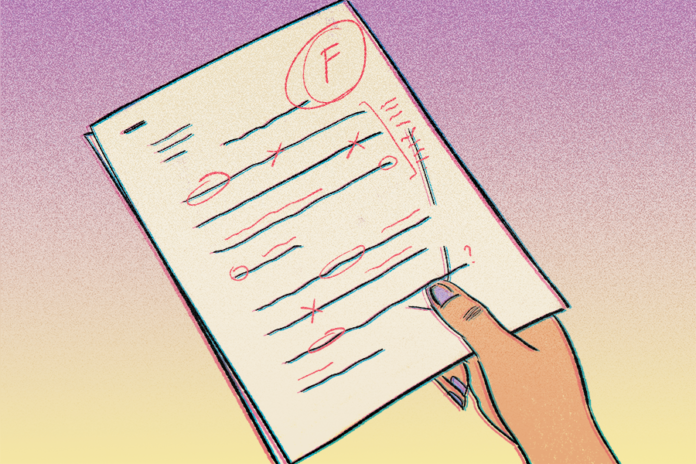You’re not wrong
By MOLLY THOMPSON — mmtthompson@ucdavis.edu
Here’s an experience that is shared across the country and among generations: your middle school English teacher responding to your innocent, honest ask of “Can I please go to the bathroom?” by saying, with every ounce of condescension and satisfaction they can muster, “I don’t know, can you?”. That teacher believed that they were right and you were wrong. They would claim that what you said was improper grammar, and should be corrected. But actually, they were wrong and you were right. Not about the fact that they were — on a technicality — more grammatically correct than you (according to Standard American English), but about the idea that what you said was a problem that needed to be corrected.
Last quarter, I took a very basic linguistics class and I haven’t stopped thinking about it since. For an assignment, my professor had us ask different people from different places whether or not they considered certain phrases “normal,” or grammatically acceptable. The phrases were “I’m finished my homework” and “I’m started my homework.” I reached out to people from the East Coast, the Midwest, and all up and down California. Out of the ten or so people I surveyed, only one said that she would consider the phrases normal if she heard someone else say them, though she would never say them herself. Everyone else vehemently asserted that they believed the phrases were incorrect, unacceptable and wrong.
I think if I had been on the other side of that little experiment and I was being asked about the phrases, I would have had a very similar reaction. I probably would have said that they were inaccurate and unsuitable. But given the perspective of the experiment, I was surprised at the sheer magnitude of the common consensus revealed by my results. People were so passionate and adamant about how abnormal and unacceptable the phrases were — I got responses like “that’s honestly so not okay,” “no, they sound weird,” “no, those sound lame” and even “I AM SO STRONGLY AGAINST THAT.”
The point of the assignment was to show us the impact that language has on how we interpret society and to highlight the value our judgments make regarding how people speak and write. If it wasn’t pointed out to me, I’m not sure I would ever have noticed how common it is for people (myself not excluded) to form these intense opinions based only on a single sentence that doesn’t comply with what we consider to be the socially acceptable dialect. The reactions I got seemed so drastic for such a small offense, but I likely would have had a similarly extreme response if I had been on the other side.
We’re taught from such a young age that there’s a singular “correct” way to articulate ourselves and many of us take pride in how well we’ve honed that skill. Standard American English (SAE) is the dialect that’s utilized by United States official organizations and is generally considered the “proper” way to speak and write in the U.S. — it’s what you were taught in English class. But it’s not the only way to speak English, nor should it be considered better than any other dialect.
SAE is the “prestige dialect” in the U.S., which means that it’s the way that professionals and the upper class are expected to speak. This becomes an issue because it means that anyone whose speech doesn’t fit into SAE is perceived as lesser (whether that be less intelligent, less qualified, of lower class, etc.) than those who are comfortable with the standard dialect. A lot of common alternative dialects come from minority populations — for example, communities of people whose first language isn’t English or racial groups for which their way of speaking English is deeply rooted in their history and culture. This contributes to a terrible feedback loop in which minorities are already oppressed and underprivileged, they might not have the resources to familiarize themselves with SAE and they don’t have opportunities to gain those necessary privileges and resources because they’re unfairly judged for whatever non-standard dialect they communicate in.
The example phrases from my assignment are perfectly acceptable phrases in many dialects of American English. Yet people immediately projected value judgments about them and their hypothetical speakers, claiming they were “weird,” “wrong” and “lame.” We shouldn’t judge people based on their grammar. Speech that isn’t compliant with SAE isn’t inaccurate or inappropriate; it’s correct in a different dialect. The point of language is to communicate. If someone said “I’m finished my homework,” you would know exactly what they were trying to convey to you, so it’s futile to claim that they’re wrong or put energy into changing how they said it. As a society, and particularly as college-educated individuals, we need to be more accepting of grammar and speech — proficiency in SAE has absolutely no correlation with intelligence, professionalism or capability. Standard American English shouldn’t inherently be perceived as an indication of value. Speak however you want to, and go tell your grammar-police middle school English teacher that you were right all along.
Written by: Molly Thompson — mmtthompson@ucdavis.edu
Disclaimer: The views and opinions expressed by individual columnists belong to the columnists alone and do not necessarily indicate the views and opinions held by The California Aggie.




